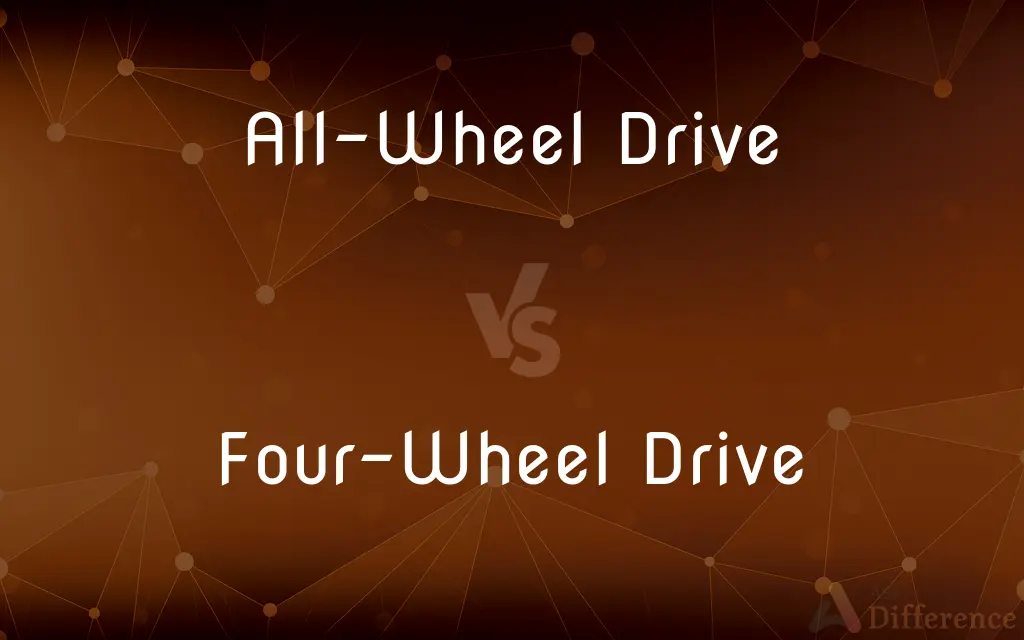All-Wheel Drive vs. Four-Wheel Drive — What's the Difference?
By Tayyaba Rehman — Published on January 11, 2024
All-Wheel Drive (AWD) provides power to both front and rear wheels automatically for improved traction, while Four-Wheel Drive (4WD) allows manual or automatic engagement of all four wheels for robust off-road capability.

Difference Between All-Wheel Drive and Four-Wheel Drive
Table of Contents
ADVERTISEMENT
Key Differences
All-Wheel Drive (AWD) systems automatically distribute power to both the front and rear wheels to optimize traction and handling under various conditions. Four-Wheel Drive (4WD), also known as 4x4, typically involves a driver-selectable system that engages all four wheels to handle more challenging terrain, like off-road conditions.
AWD is commonly found in passenger cars, crossovers, and some SUVs, providing a balance of good road handling and traction in varied conditions, like wet or snowy roads. 4WD systems are more common in trucks and off-road vehicles, offering superior performance in rugged, off-road environments.
AWD systems are usually always active, requiring no input from the driver, making them convenient for everyday driving. In contrast, 4WD can be turned on or off, usually including high and low ranges for different off-road conditions.
AWD vehicles are often more fuel-efficient compared to 4WD vehicles, as the system is optimized for on-road use and efficiency. 4WD systems, being heavier and more complex, can reduce fuel efficiency but provide significant advantages in off-road performance.
The maintenance of an AWD system is generally less complex than that of a 4WD system, which may require more frequent attention due to its more rugged design and use in demanding environments.
ADVERTISEMENT
Comparison Chart
Operation
Automatic power distribution
Manual or automatic engagement
Common Vehicle Types
Passenger cars, crossovers, SUVs
Trucks, off-road vehicles
Terrain Suitability
Varied conditions, mostly on-road
Challenging, off-road environments
Fuel Efficiency
Generally more fuel-efficient
Less fuel-efficient due to heavier build
Maintenance Requirements
Less complex maintenance
More complex, especially for off-road use
Compare with Definitions
All-Wheel Drive
Common in passenger cars and SUVs.
Many modern SUVs come with an all-wheel drive option for better traction.
Four-Wheel Drive
Ideal for rugged, off-road terrain.
Four-wheel drive vehicles excel in challenging off-road conditions.
All-Wheel Drive
Optimal for varied road conditions.
All-wheel drive provides stability in both dry and wet conditions.
Four-Wheel Drive
Manual or automatic selectable system.
I switched to four-wheel drive mode when the road became muddy.
All-Wheel Drive
Automatically powers front and rear wheels.
Her sedan's all-wheel drive system handles snowy roads effortlessly.
Four-Wheel Drive
Engages all four wheels for off-road.
His truck's four-wheel drive was crucial for navigating the mountain trail.
All-Wheel Drive
More fuel-efficient than 4WD.
Choosing all-wheel drive helped improve my vehicle's fuel economy.
Four-Wheel Drive
Found in trucks and off-road vehicles.
Most serious off-road vehicles are equipped with robust four-wheel drive systems.
All-Wheel Drive
Always active, no driver input needed.
The all-wheel drive in my car activates without any action on my part.
Four-Wheel Drive
Less fuel-efficient but great for off-roading.
Despite lower fuel efficiency, the four-wheel drive offers unparalleled control in the wilderness.
Four-Wheel Drive
(automotive) four-wheel drive when used as an attributive adjective.
Common Curiosities
Can AWD be used off-road?
While AWD can handle light off-road conditions, it's not designed for extreme off-roading.
Is 4WD better for heavy snow?
Yes, 4WD is typically more capable in deep snow and rugged conditions.
Do I need to activate AWD manually?
No, AWD operates automatically without driver input.
What is All-Wheel Drive?
A system that automatically provides power to both front and rear wheels.
Is AWD good for everyday driving?
Yes, AWD is ideal for everyday driving in various conditions.
Is 4WD more expensive to maintain?
Generally, yes, due to its complexity and use in harsh conditions.
What is Four-Wheel Drive?
A drivetrain system that can engage all four wheels, often for off-road use.
Does AWD improve fuel efficiency?
AWD can be more fuel-efficient than 4WD, but less so compared to two-wheel drive.
How do I engage 4WD?
4WD is engaged either manually through a lever or switch, or automatically in some vehicles.
Is AWD more expensive than 2WD?
Typically, yes, due to the additional complexity.
Can I turn off AWD?
No, AWD is always on and cannot be turned off.
Can I drive in 4WD all the time?
It's not recommended to use 4WD on dry pavement as it can cause drivetrain wear.
Which is better for towing, AWD or 4WD?
4WD is often better for heavy towing, especially off-road.
Do all SUVs have AWD or 4WD?
Not all; many SUVs come with either two-wheel drive, AWD, or 4WD options.
Does 4WD improve off-road capability significantly?
Yes, 4WD significantly enhances a vehicle's off-road performance.
Share Your Discovery

Previous Comparison
32-Bit Operating System vs. 64-Bit Operating System
Next Comparison
Snow vs. Snow ShowersAuthor Spotlight
Written by
Tayyaba RehmanTayyaba Rehman is a distinguished writer, currently serving as a primary contributor to askdifference.com. As a researcher in semantics and etymology, Tayyaba's passion for the complexity of languages and their distinctions has found a perfect home on the platform. Tayyaba delves into the intricacies of language, distinguishing between commonly confused words and phrases, thereby providing clarity for readers worldwide.
















































